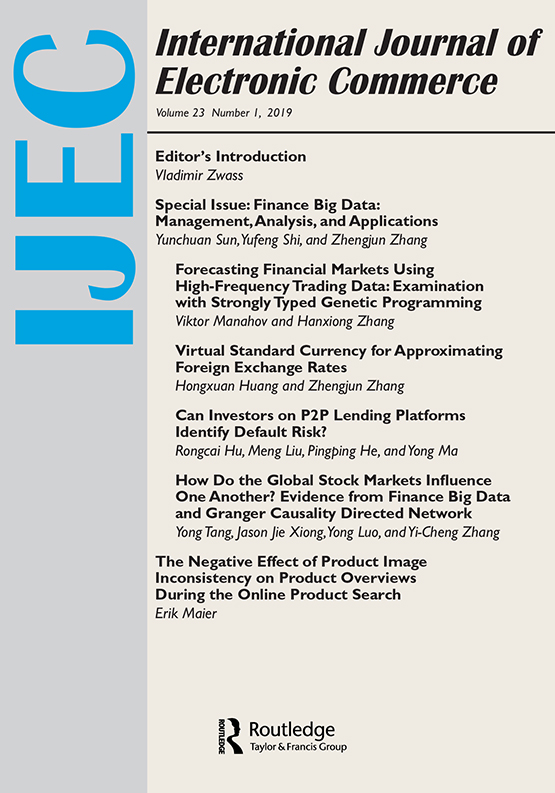编辑器的介绍
IF 3.8
3区 管理学
Q2 BUSINESS
International Journal of Electronic Commerce
Pub Date : 2021-04-03
DOI:10.1080/10864415.2021.1887693
引用次数: 0
摘要
这是我们对有效人工智能时代互联网黑暗面不满的冬天。社交媒体搅乱了我们的社会,人们对收集个人数据提出了广泛的要求,这些数据支撑着即将到来的监控经济,整个工作类别和任何数量的工作场所都面临着灭绝的威胁,大规模的安全漏洞和暴露比比皆是,在线平台所带来的集体行动面临着挑战。所有这些都发生在我们想到技术压力以及其他对个人的心理和认知挑战之前。当然,这也是一个冬天,当互联网和网络及其相关技术真正使我们能够生活和工作,加快拯救许多生命的创新,使我们能够应对紧急情况,使我们有能力共同沟通和工作,为我们的社会和社会生活提供经纬,当电子商务(EC)为我们提供食物和衣服时,金融科技代表着我们生活的巨大转变,将数字化的创新和好处分散在各国和世界各地。这些条款包括对人们的巨大好处,比如从农村地区虚拟接触大城市的医疗专家,通过大规模开放的在线课程(MOOC)开启新的追求,以及为无银行账户的人参与市场。我们都能从基于互联网的技术中获得的提升必须得到理解,有时也需要付出努力。我们对美好生活的希望必须重视有效吸收和传播强大的技术。基于互联网的技术和人工智能——主要是机器学习——是创新、生产力和人类繁荣的当代引擎。这场技术革命的速度和无情确实让我们迷失了方向,并引发了我们周围的失范。与此同时,我们也有机会继续丰富我们的个人和工作生活。我们应该记住,所有强大的技术都有黑暗面和多阶负面影响,其中许多只有在时间成熟时才会被认识到。18世纪和19世纪的工业革命给数百万人带来了苦难,然后给数十亿人带来了摆脱贫困和繁荣的自由。话虽如此,现在我们越来越意识到我们数字生活的黑暗面的特征,我们需要加强研究,把它们完整地分开来看,我们需要把研究的方向指向我们现在所感知的黑暗面。这是我们可以更充分地分享数字化好处的方式。这期关于数字化黑暗面的特刊是对这项艰巨任务的一个有价值的贡献。它的客座编辑Ofir Turel、Hamed Qahri Saremi和Isaac Vaghefi向您展示了四篇论文,这些论文聚焦于技术压力和对社交媒体的过度依赖等有害方面。作者们提请我们注意由不断出现的新技术引起的新形式的压力,对这些现象采用了新的视角,并为他们的研究带来了新的工具。已经部署了多种理论视角和研究方法,研究结果为减轻压力提供了可操作的建议《国际电子商务杂志》2021,第25卷,第2期,125-126https://doi.org/10.1080/10864415.2021.1887693本文章由计算机程序翻译,如有差异,请以英文原文为准。
Editor’s Introduction
This is the winter of our discontent with the dark sides of the Internet in the era of effective artificial intelligence. Social media roil our societies, broad claims are made about the harvesting of personal data underpinning the coming surveillance economy, entire job categories and any number of workplaces are threatened with extinction, massive security breaches and exposures abound, and the challenges of collective action enabled by online platforms are being faced. And all of this is before we think of the technostress and other psychological and cognitive challenges to individuals. Of course, this is also the winter when the Internet and the web with the associated technologies truly enable us to live and work, speed the innovations that save many lives and enable us to respond to emergencies, empower us to communicate and work together, and provide the warp and weft of our social and societal lives, and as e-commerce (EC) feeds us and clothes us. EC in HealthTech, EduTech, FinTech stands for the transformations of the great swaths of our lives that disperse the innovations and benefits of digitalization across nations and round the world. These terms comprise, among many others, such wonderful benefits to people as virtual access to a major city medical specialist from a rural location, an opening to a new pursuit via massively open online courses (or MOOC), and a participation in the marketplaces for the unbanked. The lift we all can receive from the Internet-based technologies has to be understood and sometimes earned with an effort. Our hopes for a better life must attach to the effective assimilation and diffusion of powerful technologies. The Internet-based technologies and artificial intelligence—primarily machine learning—are the contemporary engines of innovation, productivity, and human flourishing. The speed and relentlessness of this technological revolution do disorient and induce anomie that we witness all around us. At the same time, we are offered opportunities for a continuing enrichment of our personal and working lives. We should remember that all powerful technologies have dark sides and multiple-order negative effects, many of them recognized only in the fullness of time. The Industrial Revolution of the 18th and 19th centuries had brought misery to millions before bringing freedom from poverty and prosperity to billions. This having been said, now that we are increasingly aware of the features of the dark side of our digital lives, we need to intensify our research and see them whole and apart, and we need to direct our research at the actions to be taken against the dark sides we now perceive. This is the way we can all share more fully in the benefits of digitalization. This special issue on Dark Sides of Digitalization is a worthy contribution to this very large task. Its guest editors, Ofir Turel, Hamed Qahri-Saremi, and Isaac Vaghefi, present to you four papers that focus on such deleterious aspects as technostress and overdependence on social media. The authors bring to our attention the new forms of stress occasioned by the ever-emerging new technologies, adopt new perspectives on the phenomena, and bring new tools to their studies. Multiple theoretical perspectives and research methodologies have been deployed, and the results offer actionable recommendations on stress reduction INTERNATIONAL JOURNAL OF ELECTRONIC COMMERCE 2021, VOL. 25, NO. 2, 125–126 https://doi.org/10.1080/10864415.2021.1887693
求助全文
通过发布文献求助,成功后即可免费获取论文全文。
去求助
来源期刊

International Journal of Electronic Commerce
工程技术-计算机:软件工程
CiteScore
7.20
自引率
16.00%
发文量
18
审稿时长
>12 weeks
期刊介绍:
The International Journal of Electronic Commerce is the leading refereed quarterly devoted to advancing the understanding and practice of electronic commerce. It serves the needs of researchers as well as practitioners and executives involved in electronic commerce. The Journal aims to offer an integrated view of the field by presenting approaches of multiple disciplines.
Electronic commerce is the sharing of business information, maintaining business relationships, and conducting business transactions by digital means over telecommunications networks. The Journal accepts empirical and interpretive submissions that make a significant novel contribution to this field.
 求助内容:
求助内容: 应助结果提醒方式:
应助结果提醒方式:


